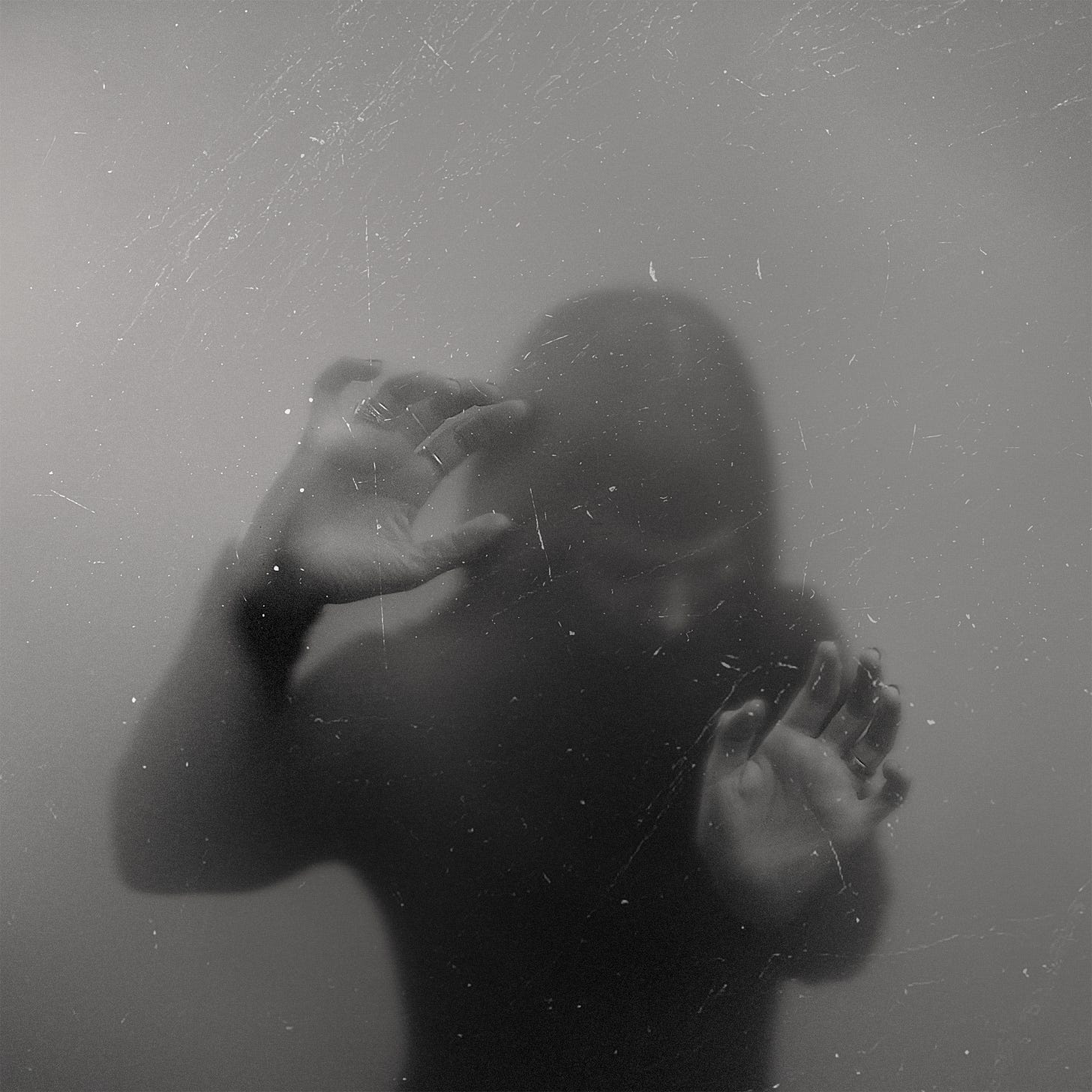Q+A with Silver Y
Listening to an album in full is an affordable luxury. I found the suggestion to listen to In the Depths by Silver Y in its entirety while reading the notes for the album, released by Bytes in late April 2025. Curiously, there was also an invitation to listeners to “find peace beyond suffering” through the album, which explores three hefty themes of psychological and physical transition: identity loss, coma and death.
Silver Y is the minimalist electronica project of Laura Caviglia, a self-taught multi-instrumentalist from Italy. Laura is also a biologist and Silver Y is also a type of moth. All I know about moths is that they can eat holes in your favourite sweaters and are attracted to light. Sweaters are not the subject here, but light is definitely a theme at play.
In the Depths is the debut release of Silver Y and it’s a richly layered and expressive sonic journey.
“It’s a concept album that moves from dark and psychedelic atmospheres toward lightness and acceptance,” explains Laura.
The haunting doom of “Stupor” begins the journey, then reassuring beats bring us up with “Rest Home” and “Shadow”. Ominous uncertainty sets in again with “Sopor” and then moves into a liminal sounding state with “Self” and “In the Depths”. Listeners reach the depth of the album with closing track “Nam Myoho Renge Kyo” and the feeling of being swelled over with water, somehow sinking with increasing lightness.
Explaining the concept of the album, Laura has said “its meaning invites us to understand the duality at the core of existence - an alternation of light and darkness that, if truly understood, can be experienced as complete light… this practice offers a way to find peace beyond suffering, and this is the invitation I want to extend to everyone through this album.”
A lot of emotional ground is covered in less than 40 minutes with In the Depths, but this also makes the album a ‘practice’ that is easy to come back to in its entirety. I hope you’ll find some time to sink into it.
Wendy
In the Depths is a concept album, yet few people currently listen to music in such a format...if they do listen in full, it's not guaranteed they will also read about (or understand) the concept underpinning the album. How does this potential disconnect make you feel as an artist?
I’m not very interested in creating something based on how people will listen to it or approach it. Creation is something free, and it starts from a necessity, not from a clear goal. Releasing a song according to rules aimed at reaching as many people as possible, or producing songs designed to match the speed of consumption and the attention deficit that characterizes this historical period, is something different — more related to business than to music. I think this is a strange time for music: we have it everywhere and all the time — in supermarkets, in every TV commercial, in restaurants (where sometimes it follows you to the bathroom) — and so on. Yet at the same time, you might be shocked to realize how truly absent is music in all of this. Therefore, I’m not interested, and I can’t control the way people decide to listen to my music, or to music in general. I know that I personally like to listen to an album from start to finish. Maybe this album is for people who listen to music the way I do.
Why or how did three specific experiences, identify loss, coma, and death, shape the songs of In the Depths?
I had this experience with a relative, and in the end I was thinking: what should I do with all these feelings and thoughts now? I just tried to tell a story — not specifically from my point of view, but rather from the perspective of people who will never be able to talk about it. I’m a biologist, a materialist, and an atheist. I believe that what we call the soul is simply something very complex that results from the functions of our brain and body. When these start to deteriorate, we begin to disappear. Coma is one of the possible outcomes — it has different stages of depth and is described by scientists as a state of unconsciousness. But if a person in this state shakes your hand, what would you think? Where are they? Is it just an unconditioned reflex, or is it a bridge? This is what I wanted to talk about.
The track "Nam Myoho Renge Kyo" beautifully closes the album. There is a feeling of being swelled over with water and slowly submerged, deeper and deeper, yet the depth brings light rather than darkness. You have referred to the song as a prayer or spiritual tune and invited listeners to 'find peace beyond suffering' through this album. Is there a song or album or artist that has made a spiritual difference in your life?
As I mentioned before, I am a atheist and I do not practice any religion. I didn’t know about this mantra; I heard it at the end of the journey I tried to describe earlier. Therefore, as a realistic story, it became the closing track of the album. Of course, I started studying the meaning of this mantra in Buddhism, and I was very drawn to it. It was exactly the kind of answer I had been looking for. Buddhism is not really a religion; it’s more a way of perceiving existence. However, Brian Eno, William Basinski, and Aphex Twin (in his ambient works) are the real spiritual prophets of my personal religion.
Vocals feature in some tracks, layered and rippling, yet lyrics are not quite discernible. How did you approach vocals for the songs on this album? Are they mainly treated as another instrument or are the lyrics significant? Are the lyrics in Italian or English or another language?
For my personal taste, the vocals on this album are a bit too discernible! I listen to a lot of shoegaze and ambient music, where the vocals (if present) are usually absorbed into the music, soaked in reverb and delay to the extreme. The lyrics are in English and they have a meaning, but I prefer when the meaning is conveyed through the sound itself. I'm not a singer, and I listen to a lot of instrumental music, so probably in the future I'll try to create more instrumental pieces.
When did you come into electronic music and production? Was there an age or life event that triggered it? Were there challenges in the electronic music or production domains that felt (or still feel) related to being a woman in this sphere? Did you have an encouraging role model?
Well, when I was a teenager, I used to fall asleep listening to Phaedra or Alpha Centauri by Tangerine Dream (I have a big brother with an incredible collection of CDs and cassettes). I also had an obsession with Keith Emerson and a photo of him with his huge modular Moogs hanging on my bedroom wall. I was a fan of Radiohead too. I didn’t understand anything — I had no idea how Tangerine Dream were making that kind of music, and I didn’t understand how that wall of holes, cables, and knobs was supposed to work. I eventually forgot about all of that, and focused on playing piano, bass, and guitar, digital synths at least. Then, three years ago, I saw an MS-20 mini at a friend's studio — it has been like Proust's Madeleine. However, the only difference between a man and a woman in doing electronic music is that generally people ask to the woman if she sings. I probably know more female artists than male in ambient music. I cited a lot of times Grouper and recently I have fallen in love with the drone music of Hüma Utku. However, I do not need encouraging models, I need inspiration, which has no gender.
What is the best thing about working on your own in music and production? What is the most challenging thing about doing so much of the work?
Electronic and ambient music are genres in which production is not something that you should delegate to someone else. All the artists of this sector are producers. In general, I do not understand very well why an artist should refer to a producer. If I need help with composition, arrangement, or sound design, I’d rather form a duo or a band than call a producer. Maybe I’ll form a duo with the producer. As a result, my work is quite lo-fi, except for the excellent mixing done by Danilo Romancino. I’m also self-taught in almost everything, and at the time I was recording the album, I didn’t have enough money to buy a good laptop. I had a very old one that would crash every time I used too many VSTs. So, there were a lot of challenges, but I accepted them all.
Is there a real world problem (cultural, social, economic, or scientific) that you believe music can help solve or assist with?
Music has great communicative power, perhaps even more than other arts. That’s why it seems to be used to make people stupid. George Orwell had already understood how music could be used for this purpose; he wrote the following sentence in 1984:
"The tune had been haunting London for weeks past. It was one of countless similar songs published for the benefit of the proles by a sub-section of the Music Department. The words of these songs were composed without any human intervention whatever, on an instrument known as a versificator. But the woman sang so tunefully as to turn the dreadful rubbish into an almost pleasant sound."
Music is currently used in the same way. Of course, it could also be used as an opposing force — that would be up to the artists to decide, even though the machinery of music production seems too powerful to oppose directly, especially now that AI has started producing music. To resist, artists do not necessarily need to address socioeconomic or political issues; they just need to make good, sincere music. As for the relationship between music and science, the answer would be too long — I recommend to read Musicophilia by Oliver Sacks.
How is it to work with and release this album with Bytes?
That was the happy part of the story. I sent Joe and Wil unfinished and unmixed demos, and they simply trusted someone they had never met before, who had never released anything, texting from a poor island on the other side of Europe. We probably share a common musical background, which makes them closer to me than many people who are geographically near. They helped me a lot.
You have said that your favourite artists are unlikely to come to where you live, who would you have come to perform live if it could be anyone?
Probably Brian Eno, Aphex Twin, Fennesz, but the list will be infinite.
What does the rest of 2025 look and sound like for Silver Y?
I need to find a booking agency and start performing outside my island. Regarding new productions, I'm planning to build a modular Eurorack and also integrate the use of Ableton (which I've already started doing). I have a lot of new feelings to put into music, and I'm fascinated by the idea of learning new techniques and selecting the modules I need to achieve the sound I want.
Limited edition CD of In the Depths available on Bandcamp. Follow Silver Y and Bytes on Instagram for more details about this release.


